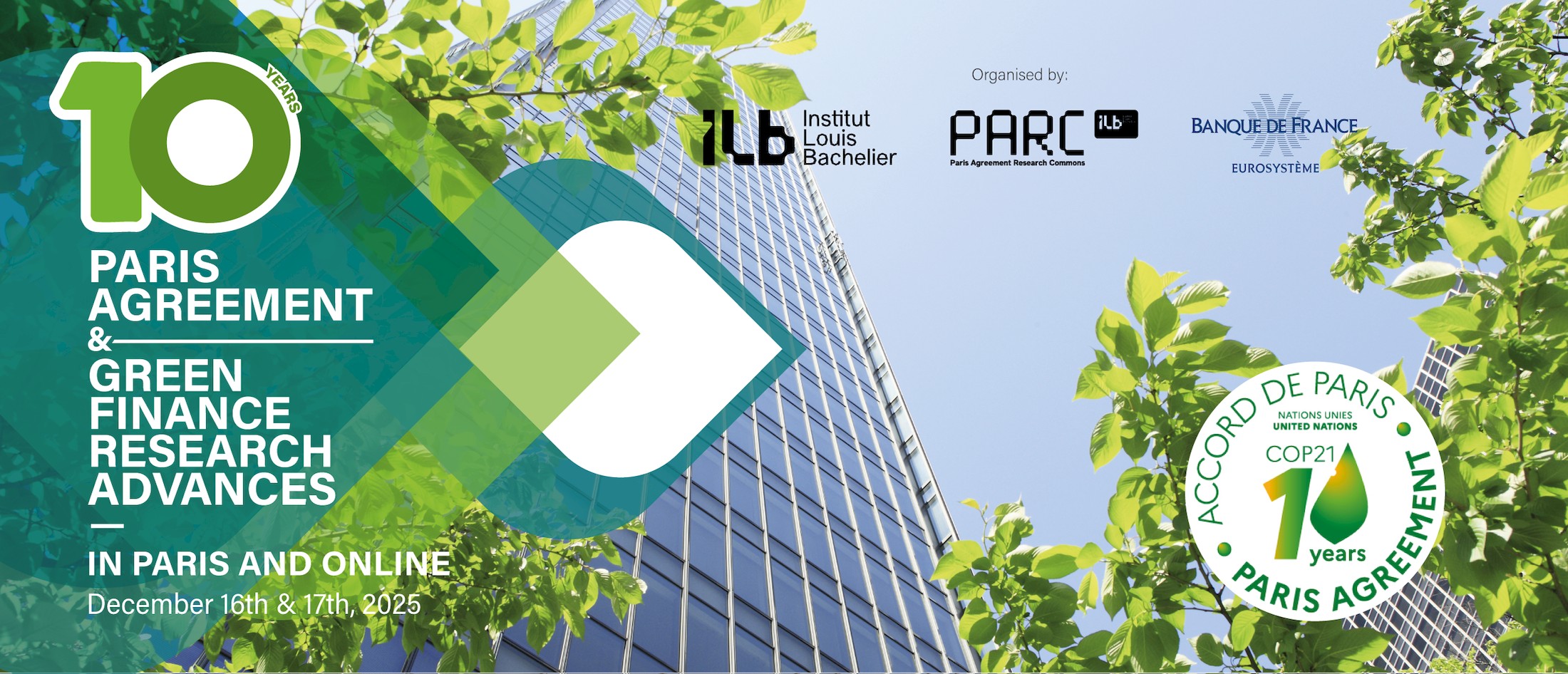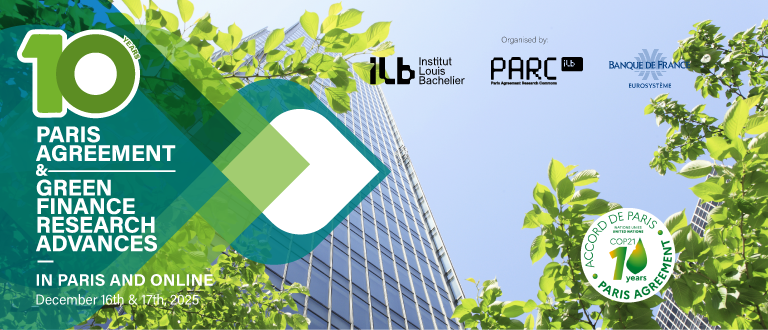



The Green Finance Research Advances (GFRA) is an international research conference for academics and professionals, co-organized by Banque de France and the Institut Louis Bachelier, with the participation of the Institut de la Finance Durable and the Institute for Climate Economics-I4CE.
We invite academics, regulators and professionals to save the date for the 10th edition of the conference, which will take place in Paris and online on December 16th-17th, 2025.
The objective of this conference is to bring together academics, finance practitioners and regulators, to discuss together research issues related to the integration of climate-related, nature-related and transition-related risks into macro-economic modelling/forecasting and into the risk assessment of the financial sector.
This year’s edition of the GFRA Conference will mark a particularly important milestone, as it is designed to serve as France’s principal academic event commemorating the 10th anniversary of the Paris Agreement with the conference having been recognised by the UNFCCC as an official event celebrating this important milestone.
The conference will begin on 16 December with a half-day high-level policy session, featuring keynote speeches and roundtable discussions on the credibility and alignment of financial flows with climate and nature goals. This will be followed on 17 December by a full day dedicated to the presentation of academic research on green finance, climate transition risk, and governance mechanisms aimed at supporting the implementation of the Paris Agreement. We hope to see you all along the two days!
14:30 – 15:15 Fireside chat and Q&A – “Global Progress on Paris Goals: What Role for Finance Now?”
Chair: Jean Boissinot, Director of Risk Analysis and Research at ACPR
Laurence Tubiana, former lead negotiator for COP 21 and current CEO of the European Climate Foundation (ECF)
Watch the replay
15:15 – 16:00 Keynote 1 – “Raising Climate Ambition: Financing The Next Generation of NDCs and the Finance to Deliver”
16:00 – 16:30 Coffee Break
16:30 – 17:30 Roundtable 1 – “From Voluntary to Systemic: Markets, Disclosure, and Instruments for Paris Alignment”
Watch the replay
Eric Usher, Head of the UNEP – Finance Initiative,
Alexandra Palt, President of WWF France
Meryam Omi, CEO of Climate Arc
Helena Viñes Fiestas, Commisioner of the Spanish Financial Markets Authority
Rémy Rioux, CEO of Agence Française de Développement
17:30 – 17:45 Keynote 2
17h45 – 18h Closing remarks
18h Light Cocktail
MORNING SESSION
8:30 – 9:00 Registration – Lobby Espace de Conference BdF
9:00 – 9:30 Welcome – Auditorium
Introductory remarks by Emmanuelle Assouan, General Director of Financial Stability and Operations, Banque de France
Watch the replay
Introductory remarks by Bertrand Badre, Former managing director for Finance World Bank, CEO of Blue Like An Orange Capital and president of the PARC foundation.
Watch the replay
9:30 – 10:30 Keynote 1 Lucia Alessi, Team Leader, Joint Research Center of the European Commission – Auditorium
Watch the replay
10:30 – 12:00 Contributed talks – 1.Levers and pathways for NDCs and scaling up ambition – Auditorium
From Pledges to Portfolios: Integrating Countries’ Climate Commitments into Sovereign Bond Investments
Authors: Eric Jondeau (University of Lausanne), Fabio Alessandrini; Lou-Salomé Vallée
Watch the replay
The economics of decarbonization commitments
Authors: Keith Jin Deng Chan, Quentin Moreau (The Hong Kong University of Science and Technology), Han Wang
Watch the replay
Can more ambitious NDCs also lead to economic growth?
Authors: Max Bohringer (OECD), Jean Chateau, Elisa Lanzi, Coline Pouille
Watch the replay
AFTERNOON SESSION
13:00 – 14:30 Contributed talks – 1.Carbon markets, climate policies and transition risks – Auditorium
Cap and Trade with Imperfect Hedging
Authors: Bruno Biais (HEC), Johan Hombert, Daniel Schmidt, Pierre Olivier Weill
Watch the replay
Mind the Emission Gap: Firm-Level Policy Stringency Matters for Emission Reductions in the EU ETS
Authors: Leonardo Bortolan, Lorenzo Prosperi, Luca Taschini (University of Edinburgh), Luca Zanin
Watch the replay
Transition Risk in Emerging Economies
Authors: Stefano Carattini, Giseong Kim, Givi Melkadze, Aude Pommeret (USMB-OFCE)
Watch the replay
14:30 – 15:30 Round table – 1.Advances in climate scenarios and frameworks – Auditorium
Climate Scenarios with Probabilities via Maximum Entropy and Indirect Elicitation
Authors: Riccardo Rebonato (EDHEC), Lionel Melin, Fangyuan Zhang
Watch the replay
Designing scenarios for the analysis of climate-related risks
Authors: Yui Matsui, Takaaki Minamii, Azusa Takeyama (Bank of Japan)
Watch the replay
Modelling advances and key results in the NGFS short-term scenarios
Authors: Stefano Battiston, Marco Duenas, Kostas Fragkiadakis, Philip Hackstock, Lucy Hager, Antoine Mandel (University Paris 1 & CLIMAFIN), Andrea Mazzocchetti, Irene Monasterolo, Karl Naumann-Woleske, Leonidas Paroussos, Stellios Tsiaras, Zoi Vrontisi, Bas van Ruijven
Watch the replay
15:30 – 16:00 Comfort Break
16:00 – 18:00 Contributed talks – 1.After the Paris Agreement – Auditorium
Financed Emissions and Banks’ Lending Portfolios
Authors:
Elsa Allman (Banque de France), Sonali Hazarika, Bill Qiao, Alev Yildirim
Watch the replay
The Green Transition: Evidence from Corporate Green Revenues
Authors: Johannes Klausmann (University of Houston – Bauer College of Business); Pedro Matos; Philipp Krueger
Watch the replay
The political economy of climate-related financial policies: Creating new paradigms or reinforcing old ones?
Authors: Paola D’Orazio (IESEG School of Management)
Watch the replay
A Framework For Structuring a Blended Finance Fund
Authors: Thierry Roncalli (Amundi Asset Management); Mohamed Ben Slimane; Jean-Marie Dumas; Adnane Lekhel
Watch the replay
18:00 – 18:30 Award of the Banque de France “Young Researchers in Green Finance” & concluding remarks – Auditorium
Presented by Alexandre Gautier, Deputy General Director of Financial Stability and Operations, Banque de France
Watch the replay
Institut Louis Bachelier (ILB)
The Institut Louis Bachelier (ILB) is an association under the law of 1901 created in 2008, at the initiative of the French Treasury and Caisse des Dépôts et Consignations. ILB funds, develops and promotes sustainable development research excellence in economics and finance. Currently hosting more than 60 research programs within four societal transitions (environmental, digital, demographic and financial), ILB is the center of collaborations between academic, as well as public and private partners on subjects of societal importance.
For more information : www.institutlouisbachelier.org
Banque de France
Should you want to know more about
the Banque de France’s Prize for Young Researchers in Green Finance, click here
I4CE
The Institute for Climate Economics (I4CE) is a Paris-based think tank with expertise in economics and finance with the mission to support action against climate change. Through its applied research, the Institute contributes to the debate on climate-related policies. It also publishes research to support financial institutions, businesses and territories in the fight against climate change and that assists with the incorporation of climate issues into their activities and operations.
Institut de la Finance Durable
The "Institut de la Finance Durable" aims to coordinate, federate and accelerate the action of the Paris financial center to achieve the ecological transition and the transformation of the economy towards a low-carbon and inclusive model, aligned with the objectives of the Paris Agreement and the Sustainable Development Goals. Created in October 2022, the IFD takes over from Finance For Tomorrow.
For more information : institutdelafinancedurable.com
ESG Data Cartography
Discover the first mapping proposition of all conventional and alternative entities (ESG data providers, specialized providers, startups, open-source platform, NGOs, …) having relevant data for dealing with main green and sustainable finance use cases.
For more information : institutlouisbachelier.org/en/esg-data-cartography
Parc
PARC purpose is to foster research & data cooperation between academia themselves and with professionals to deliver robust and innovative sustainable finance tools and models and promote their implementation by financial practitioners.
For more information : parc-research.org